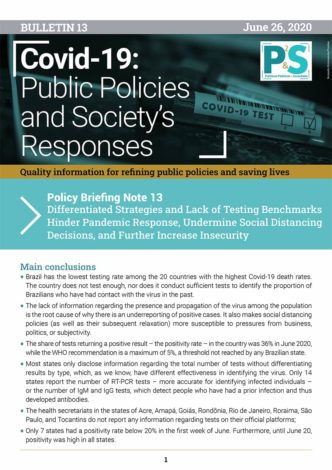Main Conclusions:
- Brazil has the lowest testing rate among the 20 countries with the highest Covid-19 death rates. The country does not test enough, nor does it conduct sufficient tests to identify the proportion of Brazilians who have had contact with the virus in the past.
- The lack of information regarding the presence and propagation of the virus among the population is the root cause of why there is an underreporting of positive cases. It also makes social distancing policies (as well as their subsequent relaxation) more susceptible to pressures from business, politics, or subjectivity.
- The share of tests returning a positive result – the positivity rate – in the country was 36% in June 2020, while the WHO recommendation is a maximum of 5%, a threshold not reached by any Brazilian state.
- Most states only disclose information regarding the total number of tests without differentiating results by type, which, as we know, have different effectiveness in identifying the virus. Only 14 states report the number of RT-PCR tests – more accurate for identifying infected individuals – or the number of IgM and IgG tests, which detect people who have had a prior infection and thus developed antibodies.
- The health secretariats in the states of Acre, Amapá, Goiás, Rondônia, Rio de Janeiro, Roraima, São Paulo, and Tocantins do not report any information regarding tests on their official platforms;
- Only 7 states had a positivity rate below 20% in the first week of June. Furthermore, until June 20, positivity was high in all states.
Work group responsible
Coordination: Tatiane C Moraes de Sousa (Fiocruz), José Eduardo Krieger (Incor-FMUSP) and Lorena Barberia (DCP-USP).
Researchers:
- Luciana Sarmento Garbayo (University of Central Florida/UCF)
- Michelle Fernández (UnB)
- Fabiana da Silva Pereira (Ciência Política – DCP/USP)
- Vanessa Trichês Pezente (Fiocruz)
- Isabel Seelaender Costa Rosa (Ciência Política – DCP/USP)


